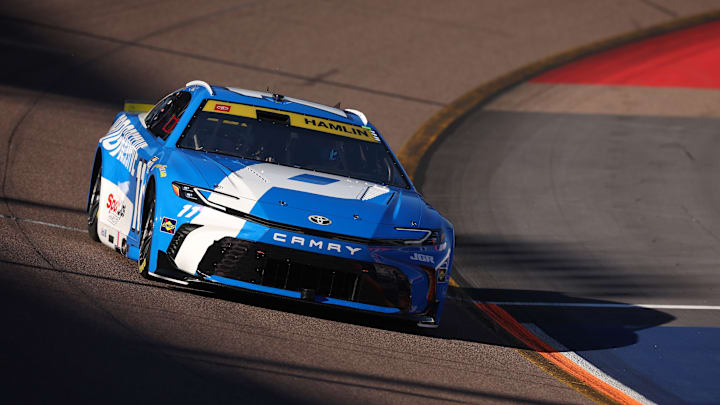Never has NASCAR's playoff format been scrutinized more than it's been over the past two years. Whether it was Joey Logano winning the 2024 championship after a 15th place finish in the regular season standings or Kyle Larson winning the 2025 championship without leading a lap in the championship race, fans have had enough of the "win and in" knockout setup.
Of course, one of the main defenses of Larson's title (other than the fact that you can't blame him for doing exactly what he needed to do at Phoenix Raceway, beating the other three contenders in the final running order) is the fact that he actually scored the most points over the course of the entire 36-race season.
It suits the narrative of the full-season points crowd, sure. But it's meaningless for a couple reasons. For one, everyone knows drivers and teams would strategize differently under different formats. Just look at Ryan Newman's stats in 2003 and compare them to champion Matt Kenseth's, and you'll see why NASCAR felt they needed a postseason format of some sort to begin with.
And two, stage racing, which was added in 2017, probably wouldn't exist had playoffs never existed. A race winner can finish as low as 11th in total points scored, and a 16th place finisher can lead all drivers in points.
Taking stages and playoffs out of the equation, Christopher Bell would have won the 2025 championship, and by a fairly wide margin.
Ironically, even by scoring more points than any other driver through the first nine playoff races (and winning one of those races), Bell wasn't even in the Championship 4.
So again, how great is NASCAR's points format in terms of rewarding what actually matters?
It's been said that DNFs are punished harder than wins are rewarded using NASCAR's points structure, and it's 100% true. Excluding stage points, a win and a DNF pay fewer points than back-to-back 15th place finishes. If we simply go on points alone, running around in 12th each week, hiding out from trouble, could literally result in a championship.
What if NASCAR utilized a points structure that is pretty much universally respected as having the right balance, one that weighs being "consistently good" over simply being "consistent"?
Here's what the final 2025 NASCAR Cup Series point standings would look like using Formula 1's points structure.
2025 NASCAR Cup Series standings using Formula 1 points format
1 - Denny Hamlin - 297 (0)
2 - Kyle Larson - 288 (-9)
3 - Christopher Bell - 281 (-16)
4 - Ryan Blaney - 270 (-27)
5 - Chase Briscoe - 255 (-42)
6 - William Byron - 217 (-80)
7 - Chase Elliott - 192 (-105)
8 - Alex Bowman - 138 (-159)
9 - Shane van Gisbergen - 134 (-163)
10 - Bubba Wallace - 133 (-164)
11 - Tyler Reddick - 129 (-168)
12 - Joey Logano - 115 (-182)
13 - Chris Buescher - 108 (-189)
14 - Brad Keselowski - 101 (-196)
14 - Ross Chastain - 101 (-196)
16 - Ty Gibbs - 87 (-210)
17 - Ryan Preece - 85 (-212)
18 - Josh Berry - 76 (-221)
19 - Carson Hocevar - 66 (-231)
20 - Daniel Suarez - 57 (-240)
21 - Kyle Busch - 54 (-243)
22 - John Hunter Nemechek - 52 (-245)
23 - Erik Jones - 51 (-246)
24 - Austin Cindric - 48 (-249)
25 - Michael McDowell - 46 (-251)
26 - A.J. Allmendinger - 44 (-253)
27 - Austin Dillon - 34 (-263)
28 - Zane Smith - 31 (-266)
29 - Todd Gilliland - 30 (-267)
30 - Ricky Stenhouse Jr. - 26 (-271)
30 - Cole Custer - 26 (-271)
32 - Noah Gragson - 17 (-280)
33 - Justin Haley - 16 (-281)
34 - Jimmie Johnson - 15 (-282)
35 - Corey Heim - 8 (-289)
36 - Ty Dillon - 4 (-293)
37 - Justin Allgaier - 2 (-295)
37 - Austin Hill - 2 (-295)
39 - Riley Herbst - 0 (-297)
39 - Cody Ware - 0 (-297)
In and of itself, it proves nothing. But the fact that we continue to get different champions with whatever hypothetical "what-if" systems we decide to use goes to show that there isn't always a correlation between the best driver, the most deserving driver, and the actual champion.
Would everyone strategize differently if the Formula 1 points system, which only awards points to the top 10 finishers of each race, were in place?
Absolutely.
But what this system does is removes the playoffs, removes stages (and thus the ability for something like running fifth instead of sixth in the middle of a mid-March race to affect an entire championship), and actually rewards good results rather than rewarding simply staying out of trouble.
Denny Hamlin's average finish this year, for instance, was 14th. But had he finished three spots higher than that in every single race, he'd have scored zero points the entire year using the F1 format. Points-wise, however, he would have averaged around a sixth place finish using the same structure.
So consistency matters using this system, but being consistently good matters more; you're not going to back into a so-called "points championship" by hiding out and racking up eighth and ninth place finishes using an F1 system like you can with NASCAR's current setup.
Now for the big question: what will NASCAR's points structure and playoff format look like in 2026? Change feels inevitable, but nobody knows what, exactly, is going to be altered.
